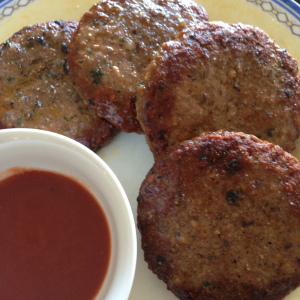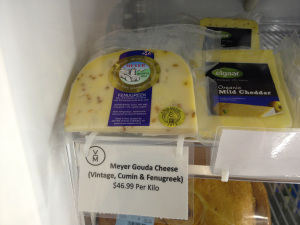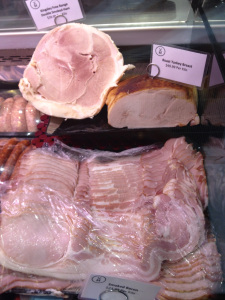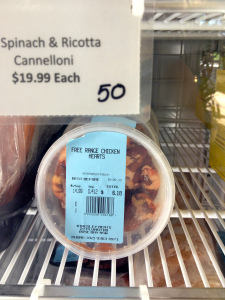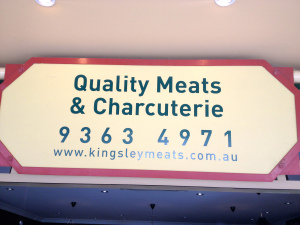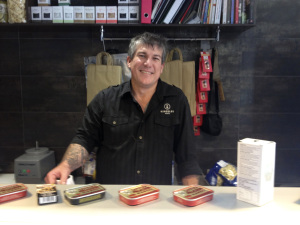A tribute to the most important people in the world: our farmers!
Guest User
Last Saturday I had the pleasure of hanging out with and engaged in riveting conversation with Rob Lennon fromGundooee Organics and Mark Hopkinson from Emerald Hill Beef. These farmers came to Kingsleys Meats butcher for an open day of meet and greet and BBQ sizzle. It was a terrific opportunity to connect with the people who rear our meat and to ask them questions and learn more about the source and provenance of the foods we eat.
Rob Lennon is Australia’s version of America’s Joel Salatin. He has a brain the size of a planet and I always feel humbled in his presence with his wealth of knowledge. Rob farms premium organic wagyu beef in a manner that I would call the high water mark of Australia’s beef farming practices. His farm (Central West NSW, about 5 hours from Sydney) is Australian certified organic and his wagyu beef is supplied to numerous butchers and providores around the country (listed on his website) plus a couple of restaurants (eg Agape Organic Restaurant) .
Here are just some of the things that we talked about that you might be interested in learning:
- Rob talks a lot about the importance of biodiversity of the microflora in the soil. Understanding and building healthy, balanced soils is the greatest priority on his farm. The nutrients in the soil end up in our bones and body, so everything comes back to the health of the soil.
- Rob’s cattle graze on predominantly “deep rooted native perennial grasses“. This goes beyond the “grass fed and finished” requirement because a “grass” also includes the cereal grasses that produce grains such as wheat, oats, barley, rye etc. THAT I didn’t know! Cereal grasses are grown in a monoculture environment with little top soil. The high water mark is “deep rooted native perennial grasses” which have access to different soil types which all contribute to supplying a varietal mix of nutrients to the plants, have better access to moisture, are adapted to our specific climate and are well established in the soil giving them resilience and affording permanent soil cover. So not all “grass fed and finished” meats are the same. Deep rooted native perennial grasses are the best, followed by cereal grasses,with grain-fed cows being at the bottom of list (in terms of nutrition, taste, animal ethics and environmental sustainability).
- Wagyu (breed of cow) is naturally marbled with fat throughout the muscle meat, even though the cows are fed only grass. For most other breeds of cow, if they are grass fed the fat is encased around the perimeter of the muscle meat and not marbled through it. Grain-fed cows produce a heavily marbled effect which the Japanese in particular covet. However Rob’s wagyu is the best of both worlds because it is grass fed and finishedAND naturally marbled which when cooked provides that melt in your mouth delicious taste experience.
- Sometimes the best way to remove weeds is to let them run their course as their very existence provides an environment where they will naturally die out without use of chemicals. You can draw analogies here to the human body.
- Resting meat after is has been cooked is important to allow the muscle fibres (which have tightened and contracted during cooking) to relax providing a better mouth feel. Resting meat also allows the juices to be reabsorbed providing more juicy tender meat.
- Cooking meat in one whole piece then cutting it into individual steak sized serves provides for better tasting and less inflammatory meat as less surface area of the meat is exposed to a hot surface.
Thank you Rob and Mark and to all of the farmers out there who raise their livestock with compassion on the most healthy pastures and who are committed to providing the best quality meat through a sustainably functioning farm ecosystem.
What can you do?
- Support the farmers whose beef is raised on deep rooted native perennial grasses or at the very least cereal grasses (as opposed on grain-fed)
- Find a butcher who has done this due diligence for you who you trust and who has close relationships with the farmers he buys from
- Before digging into your meal, take a moment to have a think about where the meat has come from and all of the people and things involved to getting your food from soil to plate. I sometimes play this game this with my kids to get them thinking about how connected we all are, the numerous steps in the chain, and to not take our food for granted.

